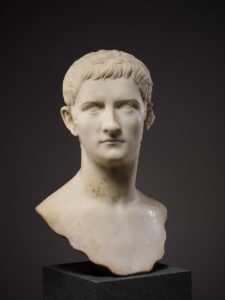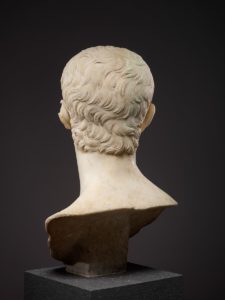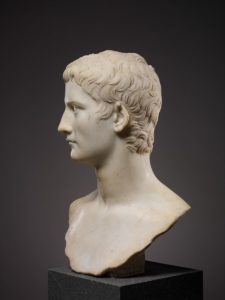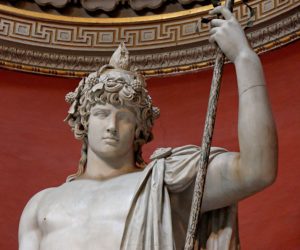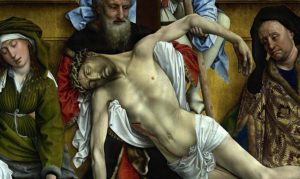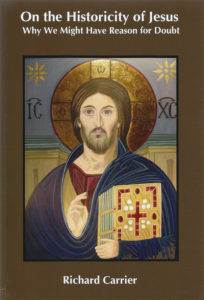by Laurent Guyénot
The foundation of the Roman church under the Flavian dynasty
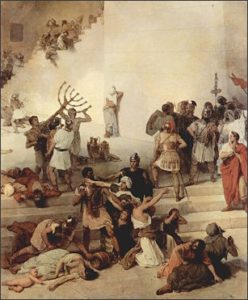
In 70, newly proclaimed emperor Vespasian and his son Titus brought to Rome about 97,000 Jewish captives (Josephus, Jewish War vi, 9), as well as members of the Jewish nobility rewarded for their support in the war in Judea—Josephus being the most famous of them.
Soon after, as Josephus started working on his Antiquities of the Jews in 20 volumes, we are told that the Gospels were written.[11]
In the same period, according to standard Church history, we already have in Rome a Christian church, headed by a certain Clement of Rome (88-99). Clement must have been an educated Jew like Josephus, because his only genuine epistle is characterized by numerous Hebraisms, abundant references to the Old Testament, and a Levitical mindset. An ancient and credible tradition makes him a freedman of consul Titus Flavius Clemens, a cousin of the Flavian emperors. We learn from Cassius Dio that Flavius Clemens was executed by Domitian, brother and successor of Titus, for ‘atheism’ and ‘deviation toward Judaic customs.’ His wife Flavia Domitilla was banished to the island of Pandateria (Ventotene). Over time, Flavius Clemens came to be regarded as a Christian martyr, and this gave rise to the idea of Domitian’s persecution of Christians. But historians now dismiss this notion (there is no clearly attested persecution of Christians prior to the middle of the third century),[12] and assume that Flavius Clemens and Flavia Domitilla were simply accused of Judaizing, and the former perhaps of circumcising himself.[13] One of Domitian’s assassins in 96 was a steward of Domitilla named Stephanus, which may suggests a Jewish vengeance.
The attitude of the Flavians towards the Jews was apparently twofold. On the one hand, they seemed determined to do away with the Jewish religion, which they saw, correctly, as the source of Jewish separatism. Not content with having destroyed the Jewish temple in Jerusalem, Vespasian also ordered the destruction of the one in Leontopolis, Egypt. In general, the Romans used to integrate the vanquished gods with a ceremony of evocatio deorum, by which the god was granted a sanctuary in Rome. But the god Yahweh was considered inassimilable, which is why his objects of worship were treated as mere booty, according to Emily Schmidt: ‘The treatment of the Jewish god can be seen as an inversion of the typical Roman treatment of or attitude towards foreign gods, perhaps as an anti-evocatio.’[14]
On the other hand, Josephus’ biography shows that Vespasian and Titus were not just merciful, but even grateful to the Jews who had rallied to them in Judea. There is no contradiction between those two aspects of the Flavians’ Jewish policy: they repressed Jewish separatism and forbade Jewish proselytizing but encouraged Jewish assimilation. Assimilationist Jews abandoned circumcision and had no objection to the syncretic assimilation of Yahweh with Zeus or Jupiter. The same basic twofold policy was followed by the Flavians’ successors Trajan (98-117) and Hadrian (117-138).[15]
From these basic facts, and keeping in mind the pattern set by Ezra’s priestly circle in Babylon, it is not difficult to imagine what was going on in Rome in the first century. The theory I’m going to discuss now goes like this. The cornerstone of the Roman Catholic Church was first laid by a secret brotherhood of priestly Jews, who had been brought to Rome by Vespasian and Titus in the aftermath of the Jewish War that destroyed their Temple in 70 AD. Some had gained Vespasian’s favor and protection by handing him the fabulous Temple treasure that made possible his ascension to the imperial throne. Flavius Josephus, who had defected to the Romans in Galilee and was rewarded beyond measure by Vespasian, may have been an influential member of that Jewish circle. Those powerful, wealthy and self-conscious Jews, using assimilation for dissimulation, had the motive, the means and the opportunity to fabricate the syncretic religion that could serve as their Trojan horse.
I borrow this theory from Flavio Barbiero’s book The Secret Society of Moses: The Mosaic Bloodline and a Conspiracy Spanning Three Millennia (2010). The author is not a trained historian, but a scientist with a sharp inquisitive and logical mind combined with a great imagination and a taste for sweeping theories. There is a great deal of speculation in the grand story he unfolds, from Moses to modern times, but it is insightful and consistent. At least it is a good starting point for trying to answer the question of how the Jews created Christianity.
According to that thesis, these priestly Jews brought to Rome by Vespasian and Titus had come to terms with the ruin of their nation and Temple, but they had not given up on their biblical program of Jewish supremacy; they simply reinterpreted it from their new vantage point inside the Empire’s capital. Still jealous of their birth and strictly endogamous, they retained and passed on to their progeny a sense of mission to pave for Israel a new road towards its destiny. Can we not even assume that, under their apparent loyalty to the Emperor, they shared the same hatred of Rome that inspired first-century Jewish texts like the Apocalypses of Ezra and of Baruch?
In Ezra, the roar of the Lion of Judah makes the Roman eagle bursts into flame, and a reunited and free Israel is gathered in Palestine. In Baruch, the Messiah routs and destroys the Roman armies, then brings the Roman emperor in chains to Mount Zion and puts him to death.[16] The same hatred of Rome permeates the Book of Revelation, where Rome, under the thin veil of Babylon, is called the Great Harlot, whose flesh will be consumed by God’s wrath, to make way for a brand new Jerusalem.
______ 卐 ______
Editor’s note: Already from Nietzsche’s texts it was clear that the author of the Book of Revelation was a Jew who hated Rome in a hellish way. If there is one overtly anti-Roman text in the New Testament it is the one attributed to the Jew John of Patmos (not to be confused with John the Evangelist, let alone the fictional figure of John the Apostle).
It was a book written after the destruction of Jerusalem. No wonder the Jew John of Patmos dreamed of a ‘New Jerusalem’ in the final book of the Bible!
______ 卐 ______
Let us consider, as a working hypothesis, that these Jewish priests had a plan. They adopted the network strategy that had allowed their distant ancestors to infiltrate the Persian court and thereby regain their lost power under the patronage of Ezra. Their goal, according to Flavio Barbiero, was ‘taking possession of the newborn Christian religion and transforming it into a solid power basis for the priestly family’ (p. 146). There existed already a cult of Christ, attested by Paul’s epistles written in the 50s, but the Gospels gave it a completely different orientation in the decades following the destruction of the Temple. The Law-abiding Peter, presented as the head of the Jerusalem Church by the Gospel of Matthew, was made the founder of the Roman papacy in the literature attributed to Clement of Rome, thus establishing a spiritual bond between Rome and Jerusalem.
To get a better understanding of the Jewish community that elaborated these traditions, we must take a closer look at the first Jewish war. In 67, emperor Nero sent his army commander Vespasian to crush the rebellion of the priestly Sadducees who had defied Roman power by banning from the Temple the daily sacrifices offered in the name and at the expense of the Emperor. When, after Nero’s death, Vespasian was declared emperor in December 69, his son Titus was left in Judea to finish putting down the rebellion.
In Book vi of Josephus’ Jewish War we learn that, from the early stage of Titus’ siege of Jerusalem, many Jews went over to the Romans, including ‘heads of the priestly families.’ Titus ‘not only received these men very kindly in other respects, but […] told them, that when he was gotten clear of this war, he would restore each of them to their possessions again.’ Until the last days of the siege, Josephus informs us, some priests obtained safe conduct under the condition that they handed to Titus some of the Temple’s wealth.
One, named Jesus, delivered ‘two candlesticks similar to those that were deposited in the Temple, some tables, some drinking chalices and cups, all of solid gold. He also handed over the curtains [those that were torn as Jesus expired according to Matthew 27:51], the robes of the high priest, with the precious stones and many other objects used for sacrifices.’ Another, named Phineas, introduced by Josephus as ‘the guardian of the Temple treasure,’ handed over ‘the priests’ tunics and belts, a large quantity of purple and scarlet cloth […] and a large quantity of the sacred ornaments, thanks to which, even if he was a prisoner of war, he obtained the amnesty reserved for deserters.’
Those priests obviously bargained their lives and their freedom with parts of the Temple treasure. The Temple was not just a religious sanctuary, it was, in a real sense, a central bank and a giant vault, harboring enormous quantities of gold, silver, and precious artifacts financed by tithes from around the world. One of the purposes of the Temple, we could say, was to satisfy Yahweh’s greed: ‘I shall fill this Temple with glory, says Yahweh Sabaoth. Mine is the silver, mine the gold!’ (Haggai 2:7).[17] According to the Copper Scroll found near the Dead Sea in 1952, the Temple treasure, amounting to tons of gold, silver, and precious items, had been hidden during the siege in 64 locations.[18] So it is logical to assume, as Barbiero does, that Titus and Vespasian were only able to get their hands on it with the help of high-ranking priests.
This huge booty, of which the symbolic centerpiece was the enormous menorah depicted on the Arch of Titus (opening picture), certainly helped Vespasian to earn the acclamation of his troops as emperor, and then to convince the Senate. The construction of the Coliseum, between 70 and 80, was entirely financed by this booty.
______________
[11] The earliest gospel, the Gospel of Mark, is commonly dated in the late 60s, but that date is much too early, especially since it mentions the destruction of the Temple.
[12] Tacitus wrote in the Annals (xv, 44) that Nero accused Christians of starting the great fire of Rome in 64, and had many of them ‘thrown to the beasts, crucified, and burned alive.’ But this is the only attestation of that story, and some modern scholars have cast doubt on its credibility. Richard Carrier sees it as a later Christian interpolation, and Brent Shaw argues that Nero’s persecution is a myth. There is one other mention of persecution against Christians before the third century, in a letter written to Trajan by Pliny the Younger, governor of Bithynia (north of Asia Minor). But this letter is of dubious authenticity as well, belonging to a book of 121 letters found in the 16th century, copied, and lost again.
[13] Paul Mattei, Le Christianisme antique: De Jésus à Constantin, Armand Colin, 2011, p. 119.
[14] Emily A. Schmidt, ‘The Flavian Triumph and the Arch of Titus: The Jewish God in Flavian Rome,’ UC Santa Barbara: Ancient Borderlands Research Focus Group, 2010.
[15] Trajan is said to have had a pro-Jewish wife, Pompeia Plotina, and he once sentenced to death a Greek dignitary named Hermaiskos for having complained that the emperor’s entourage was ‘full of impious Jews.’ (Joseph Mélèze Modrzejewski, The Jews of Egypt – From Rameses II to Emperor Hadrian, Princeton University Press, 1997, p. 193-196). But Hadrian is credited for having banned circumcision, and, when faced in 132 with a new anti-Roman Jewish uprising in Judea, led by Simon bar Kokhba, he destroyed Jerusalem once more, converted it into a Greek city named Aelia Capitolina, and forbade Jews to enter it.
[16] Norman Cohn, The Pursuit of the Millennium, Essential Books, 1957, p. 4.
[17] According to 1Kings 10:14, the amount of gold hoarded each year into Salomon’s temple was ‘666 talents of gold’ (1 talent = 30kg). Salomon’s treasure may be legendary, but it illustrates what the Jerusalem Temple still meant for the priests of the first century AD.
[18] Because the Copper Scroll is part of the so-called Dead Sea Scrolls, which have been wrongly assigned an Essenian origin for decades, its content was long considered fictional. The revision of this misguided theory, pioneered by Norman Golb in Who wrote the Dead Sea scrolls?: The search for the secret of Qumran, Scribner, 1995, has corrected that bias.

